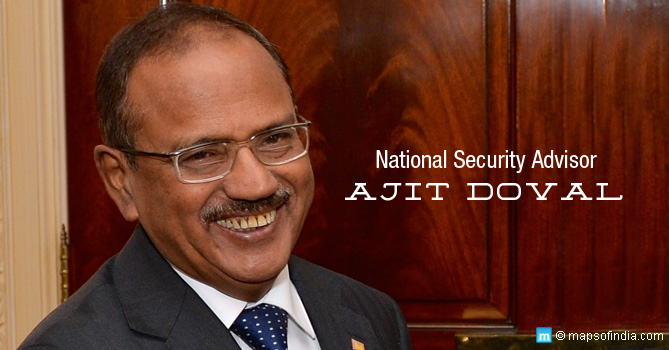
Ajit Doval, 75, is currently India’s National Security Advisor (NSA) to Prime Minister Narendra Modi. He took office on May 30 2014, soon after the Narendra Modi government was sworn in after the landslide victory in the 2014 elections. He is the 5th NSA of India and is also the first police officer to be awarded the Kirti Chakra, a gallantry award given only to military personnel. On June 3, 2019, he was reappointed as NSA for five years and was given Union Cabinet Minister Rank.
A career police officer, Ajit Doval spent the major part of his career as an active field Intelligence officer with the Intelligence Bureau (IB). He headed the agency as its Director between July 2004 and January 2005 and has built a reputation for being a staunch nationalist and also for taking a hardline against terrorism and militancy.
Post-retirement, he headed the Vivekananda International Foundation as its Founder Director.
With PM Modi leading the way in defining India’s foreign policy, Ajit Doval has his hands full in ensuring the path to that policy remains without obstruction while also ensuring India’s security and geostrategic interests remain secure.
Here are 10 things to know about the National Security Advisor (Ajit Doval) to the Modi Government:
1. Family and Educational Background
Ajit Doval was born on January 20, 1945, in village Ghiri Banelsyun, Pauri Garhwal, Uttarakhand. His father served in the Indian Army, and his mother was a housewife. His schooling was at Ajmer Military School, Rajasthan, and he subsequently completed his Masters in Economics from Agra University in 1967, where he topped his class. After becoming an IPS officer from the Kerala cadre, he shifted to the Intelligence Bureau and headed its operations wing for over a decade.
2. Role in guiding India’s covert raid on militants in Myanmar
In June 2015, militants belonging to the NSCN (Khaplang) faction attacked an army convoy of 6 Dogra Regiment, killing 18 soldiers and wounding 15. In a swift response, India for the first time undertook a covert surgical strike led by Commandos of the 21 Para (Special Forces) Regiment deep into the jungles of Myanmar and neutralised over 100 suspected militants.
It was Ajit Doval, as the NSA, who pushed for direct and immediate response and was fully supported by the Army Chief and the Prime Minister. Doval has had extensive field experience working undercover with various militant groups in the North East and has firsthand exposure of the ground scenario in the border areas there.
3. Role in facilitating Talks with Pakistan
Ever since taking over as NSA, Ajit Doval has been busy pushing for better integration and coordination between India’s various intelligence services, and ensuring that all remain on the same page on India’s security policy.
Ajit Doval, with his vast experience and understanding of politics in Pakistan, has been busy in establishing back-channel diplomacy with his counterpart Lt Gen Nasir Janjua (Retd), to figure out a way to meaningfully engage with the security establishment there. PM Modi’s supposedly impromptu trip to Lahore was primarily engineered by Doval and backed by the Foreign Service team there.
4. Bringing MNF to the Negotiating Table
For over two decades, Mizoram witnessed a violent movement primarily led by the mercurial MNF leader Laldenga. It was Ajit Doval, living and working undercover in the jungles of Myanmar, who successfully engineered the defection of six out of seven of Laldenga’s closest associates, and got them to break ranks with Laldenga and support the Indian state. It was this brilliant move that forced Laldenga to come to the negotiating table. Doval’s contribution can be gauged by the fact that Mizoram has been the most peaceful state in the North East ever since.
5. Role in Operation Black Thunder
The 80s saw the Khalistan militancy peak in Punjab, and Ajit Doval was an active field agent working to infiltrate militant groups operating there. In the run-up to Operation Black Thunder, Doval worked as a rickshaw puller in the Golden Temple area and subsequently made contact with the militants holed up inside the Golden Temple, posing as a Pakistani ISI agent, who was stationed there to support them.
Having gained their trust, Doval managed to infiltrate the Golden Temple, and it was his invaluable intelligence given to the NSG that facilitated a successful strike against the militants with minimum casualties to life and property in the temple complex. He was given the Kirti Chakra for his services, a first by any Indian police officer.
6. Six years undercover in Pakistan
Ajit Doval took his career as a field officer seriously and went to great lengths to do whatever it took to undertake his task. With Pakistan as a significant adversary, he mastered Urdu and is an expert on Pakistani history, culture and politics. This helped him remain undercover in Pakistan for over six years, undertaking various tasks at considerable risk to his life. The fact that he remained undetected and continued to carry out his duties despite extensive ISI surveillance speaks volumes of Doval’s capability and commitment to the Indian cause.
7. Negotiating with Hijackers of IC 814 in Kandahar
In 1999, Indian Airlines IC 814 was hijacked to Kandahar. Although India’s capitulation to the hijacker’s demands was a political decision and subsequently criticised, it was Ajit Doval’s deft handling of the situation and negotiation with the hijackers that prevented further loss of life and damage to the aircraft.
8. Fighting militancy in Kashmir Valley
Kashmir Valley has been reeling under Pakistan-sponsored militancy. In 1990, the government dispatched Ajit Doval to infiltrate the militants there. He was soon successful in turning a known militant Kuka Parray against other hardline militants. Kuka Parray was extended full support in terms of weapons and training, and he, in turn, was successful in neutralising several known militants operating in the valley at the time. Doval’s work in the valley resulted in smooth elections that were held in the valley in 1996.
9. Role in Sikkim’s integration with India
Sikkim, which was an independent state under India’s protection, had been a point of interest for China. In 1975, in a swift move to counter Chinese moves into Sikkim, Indian Army moved into Sikkim and soon it became India’s 22nd state. Here again, it was Ajit Doval working in the background that opened the path for the Army to move in swiftly and subsequently organise a referendum to do away with the monarchy, thus paving the way for integration with India.
10. Latest activities
Ajit Doval is widely known for his military tactics such as ‘Defensive Offensive’ as well as the ‘Double Squeeze Strategy. It has also been speculated that the Indian surgical strikes of September 2016 in Pakistan were his brainchild.
Doval, along with Subrahmanyam Jaishankar, the current External Affairs Minister and the then Indian Ambassador to China Vijay Keshav Gokhale, has been credited for resolving the Doklam Standoff through diplomatic channels.
In October 2018, he was appointed as the Chairman of the Strategic Policy Group (SPG), which is the first tier of a three-tier structure at the National Security Council and forms the nucleus of its decision-making apparatus. He is famous in media as India’s real-life James Bond.




